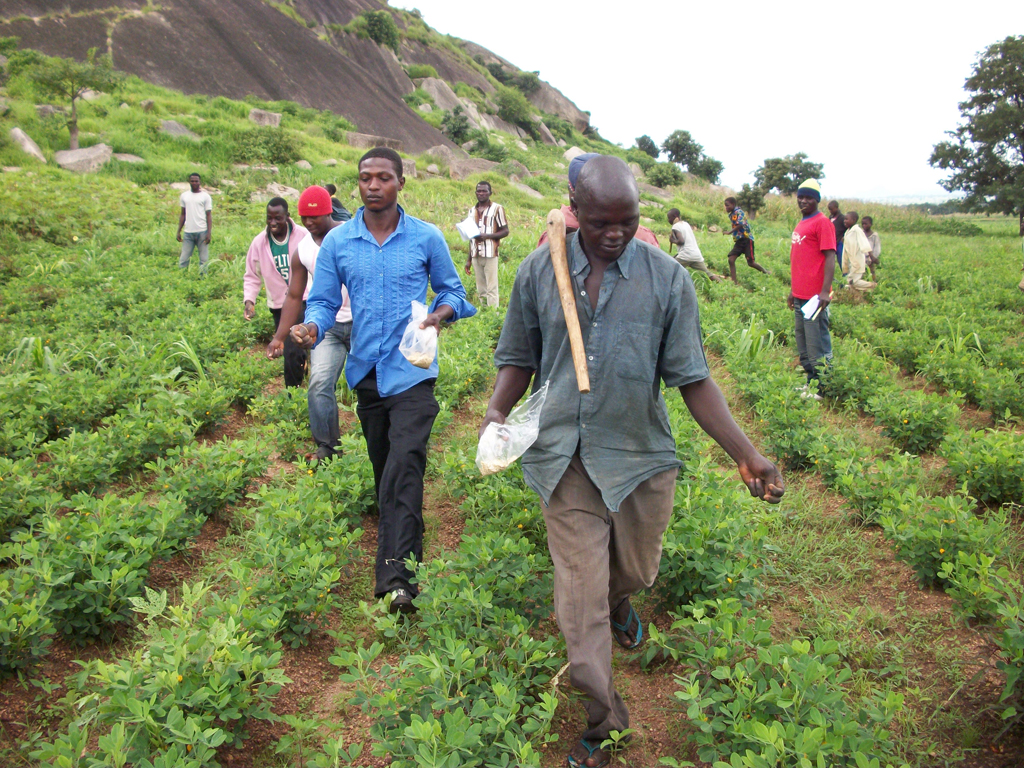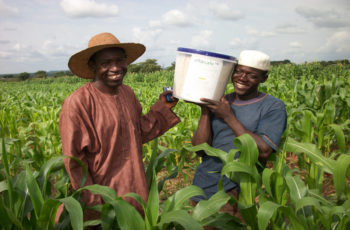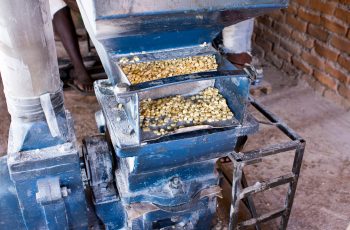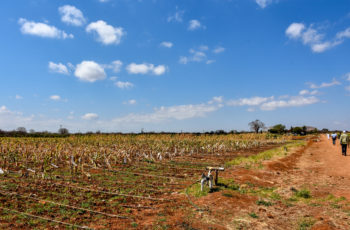ATAI Announces Funding for Three Randomized Evaluations and Three Proposal Development Grants from Fall 2019

Credit: IITA
The ATAI program announces its second round of research awards focused on understanding the drivers of agricultural transformation, totaling $581,609. The first decade of ATAI research, aimed at inducing technology adoption by relaxing a menu of constraints, illuminated that further changes are needed in how farmers interact with markets. Absent these changes farmers will not be able to relax the necessary constraints to induce transformative change. In late 2019, the program funded three full-scale randomized evaluations and three exploratory proposal development grants to further understanding about how to improve smallholders interactions with markets to increase agricultural productivity.
Quality to Improve Market Linkages
An important reason for the absence of deeper linkages between smallholder farmers and markets is that smallholders’ output often does not meet the phytosanitary or quality standards required for commercial sale. For instance, many farmers in hot, humid climates struggle to prevent aflatoxin, a toxic contaminate. This leads many premium food processors to reject a large share of grains that are brought to them, effectively shutting the growers out of value chains and larger markets. This in turn discourages farmers from making investments to boost their productivity or improve the quality of their output. Two studies funded in ATAI’s most recent funding round test different strategies to help farmers access larger markets by preventing aflatoxin contamination.
In Senegal, Laura Schechter (University of Wisconsin-Madison), Tanguy Bernard (University of Bordeaux, IFPRI), and Joshua Deutschmann (University of Wisconsin-Madison) will test different contracts that encourage farmers to adopt Aflasafe, a new product developed by IITA which reduces aflatoxin incidence by 80 – 99 percent. Encouragement offered to farmers will take one of three forms, or a combination of all three: 1) farmers will be offered Aflasafe at no-upfront cost and instead repay at harvest; 2) farmers will be guaranteed a higher price for output with low-aflatoxin levels; or 3) farmers will receive extension advice on the proper use of Aflasafe. Researchers assess how this information about Aflasafe, and the incentives to use this information, affect Aflasafe adoption and aflatoxin incidence. Since aflatoxin poses a serious public health threat and can cause economic harm by destroying crops, the evaluation has the potential to help link farmers to export markets in areas currently suffering from low crop quality standards due to high contamination rates.
In Rwanda, post-harvest rains impede smallholder farmers from properly drying their maize in the sun, and improper drying can lead to aflatoxin contamination which hinders cooperatives from selling their crops to processors. Without successful links to processors, it remains risky for cooperatives to invest in productivity-increasing agricultural inputs like chemical fertilizer and improved seeds. Jonathan Robinson (UC Santa Cruz), Alan Spearot (UC Santa Cruz), Shilpa Aggarwal (Indian School of Business), and Susan Godlonton (University of Williams) are working with Kumwe Harvest, a start-up which buys maize directly from cooperatives and processes it in-house with drying machines. By selling their maize to Kumwe Harvest immediately after harvest, farmers will receive payment faster, eliminate the possibility of post-harvest losses, and reduce the labor and capital costs that come with drying maize themselves. This evaluation will shed light on whether the benefits farmers incur from engaging with Kumwe Harvest can increase their investment in productive inputs and improve overall crop quality.
Information to Improve Market Efficiency
Rural African markets’ high prevalence of counterfeit goods also lowers input quality and consistency and hinders agricultural productivity. If farmers have trouble detecting low-quality, possibly counterfeit maize seeds, then information about a seed verification system could help them discern seed quality at the time of sale and, thereby, improve the efficiency of the seed market. In Kenya, Eric Hsu (UC Berkeley), Ted Miguel (UC Berkeley), Anne Wacera Wambugu (Strathmore University) are partnering with the Ministry of Agriculture and the Kenya Plant Health Inspectorate Service (KEPHIS) for a randomized evaluation to determine if sharing 1) information to help farmers identify sub-standard products using KEPHIS’ existing SMS-based seed quality verification system and 2) information to help farmers report substandard products will improve the quality of the input market. They will assess how information about the SMS-based system and reporting mechanisms affects buyer and seller behavior in the hybrid seed market and agricultural outcomes.
The Importance of Early Stage Development to Understand Agricultural Transformations
Finding the right partners and places to ask questions is paramount to understanding the drivers of agricultural transformation. To facilitate opportunities for researchers and partners to develop trust and scope early-stage evaluation questions, ATAI funds small Proposal Development grants. These support very preliminary, exploratory research activities, including researcher travel. This round, ATAI funded the three following Proposal Development grants:
- Dylan Groves (Columbia University) will explore the feasibility of randomizing the Government of Namibia’s plan to resettle northern communal livestock farmers on to commercial farms in southern Namibia.
- Jedediah Silver (UC Berkeley) and Ethan Ligon (UC Berkeley) will examine cassava as a mechanism for saving and consumption smoothing and explore alternative commercial possibilities for the crop in Uganda.
- Matthew Suandi (UC Berkeley) and Livia Alfonsi (UC Berkeley) will investigate the feasibility of a future randomized evaluation to study the average benefits of various machine ownership schemes in Ethiopia.


